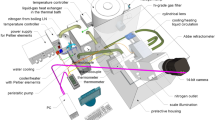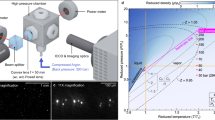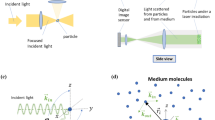Abstract
IT is well known that liquids which mix completely above a certain critical temperature, e.g. phenol and water, exhibit a strong and characteristic opalescence as the temperature of the mixture is lowered to a point slightly above that at which the components separate. A quantitative theory of this phenomenon was put forward by Einstein (Annalen der Physik, vol. 33, 1910) on the basis of thermodynamical reasoning, the spontaneous local fluctuations of concentration of the mixture being taken into account and the light-scattering due to the resulting fluctuations of refractive index being evaluated. He obtained as the expression for the light-scattering
This is a preview of subscription content, access via your institution
Access options
Subscribe to this journal
Receive 51 print issues and online access
$199.00 per year
only $3.90 per issue
Buy this article
- Purchase on Springer Link
- Instant access to full article PDF
Prices may be subject to local taxes which are calculated during checkout
Similar content being viewed by others
Author information
Authors and Affiliations
Rights and permissions
About this article
Cite this article
RAMAN, C. Opalescence Phenomena in Liquid Mixtures. Nature 110, 77–78 (1922). https://doi.org/10.1038/110077b0
Issue Date:
DOI: https://doi.org/10.1038/110077b0
Comments
By submitting a comment you agree to abide by our Terms and Community Guidelines. If you find something abusive or that does not comply with our terms or guidelines please flag it as inappropriate.



